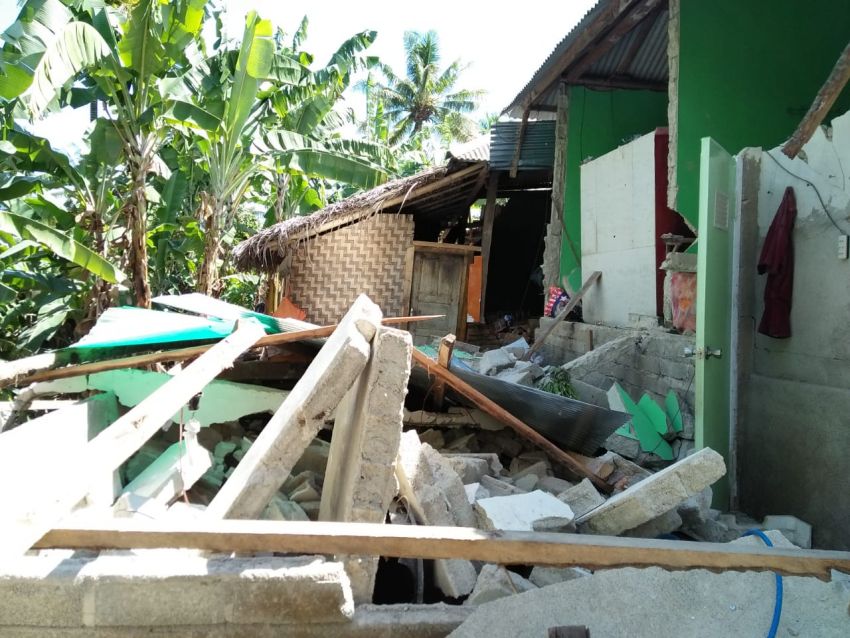with our monthly newsletter.
Source: INOVASI
"Before the earthquake, we studied in class but then we had to study under a large mango tree. We were not calm learning because our school buildings were demolished. The noisy area made us want to go home quickly.”
Eight-year-old Muhammad Sakir speaks softly as he remembers when the earthquake hit his family’s home in North Lombok, Indonesia. The destructive 6.9 magnitude earthquake was followed by another 6.9 just weeks later. Officials stated that at least 80% of structures across the North Lombok district were either damaged or destroyed. By the end of August, it was confirmed a total of 563 people were killed and more than 1,000 injured. Over 417,000 people were displaced. These earthquakes were the strongest to hit Lombok in recorded history.
Globally, education is disrupted for more than 37 million children each year due to environmental threats. This number is only expected to increase: in the Asia Pacific region, it is estimated that 200 million children will have their lives severely disrupted by disasters each year in the coming decades. In South Asia alone, 18,000 schools were shut in 2017 from the region’s worst flooding in years.

Local Partners and Local Solutions
The 2018 Lombok earthquake presented an important learning curve for Palladium’s Innovation for Indonesia’s School Children (INOVASI) program, a partnership between the Australian and Indonesian governments. How could we get children back into school, and quickly?
INOVASI works directly with a range of community stakeholders in North Lombok, including students like Muhammad. INOVASI began working with its local partners to understand the top needs and identify practical solutions and available local resources. The team led workshops for educators, policy makers, principals, teachers, parents, students, and community members – many who were affected by the earthquake themselves. Able to share their experiences and ideas in a safe space, community members young and old listed their top concerns post-earthquake:
- Structures: Temporary school structures were difficult to maintain, with strong wind and dust, unmanageable garbage, noise from overcrowding, and lack of toilet facilities
- Safe Spaces: There were no safe spaces where children could gather, as they were now living in different camp sites after the earthquake
- Teaching: Many teachers were unsure whether to continue the standard curriculum or to focus only on ‘fun’ activities that children would enjoy
- Anxiety: Children and parents were ready to move on from the earthquake, but still had a high level of anxiety
- New Ideas: Teachers and principals were running out of ideas for activities that were fun, and that helped to lessen stress and anxiety
From these needs, INOVASI worked with local stakeholders to devise new strategies to get children back to school safely, including psycho-social counselling and education for affected students and communities, and temporary classroom construction using local materials like bamboo. INOVASI worked with ABKIN, the Indonesian Guidance and Counselling Association, to conduct various psycho-education activities to quickly support children – and teachers - and help them adapt to their new learning environment.
Supporting Teachers
Teaching post-disaster is especially challenging for teachers. Fitria Kaplale, a teacher at Pemenang Barat 2 primary school, described the difficulty in returning to learning post-earthquake, where children felt uneasy and the learning process was carried out in hot tents. Students couldn’t concentrate.
Fitria participated in INOVASI’s post-earthquake emergency schooling response in North Lombok, along with another teacher and principal from her school. The training aimed to help teachers reduce the level of student trauma by implementing play and imagination based learning strategies. She put her new knowledge and skills into practice with her own students.
“Even though schools were destroyed, and books didn’t exist, we could start learning around us,” she said. “[We could] observe plants that grow, calculate tree height, and other ideas.”
“I did not expect the response of my students like that. I think this is amazing because sometimes they suddenly sing the songs that I have taught as if they invited me to do it again. I hope that with this, parents will also be more calm to let go of their children studying at school.”
By working with local communities and supporting all the stakeholders involved in education, North Lombok has gotten their children back to school quickly, and are better prepared for the next time disaster may strike.
INOVASI is implemented by Palladium, with funding from Australia’s Department of Foreign Affairs and Trade (DFAT) and Indonesia’s Ministry of Education and Culture.
with our monthly newsletter.

